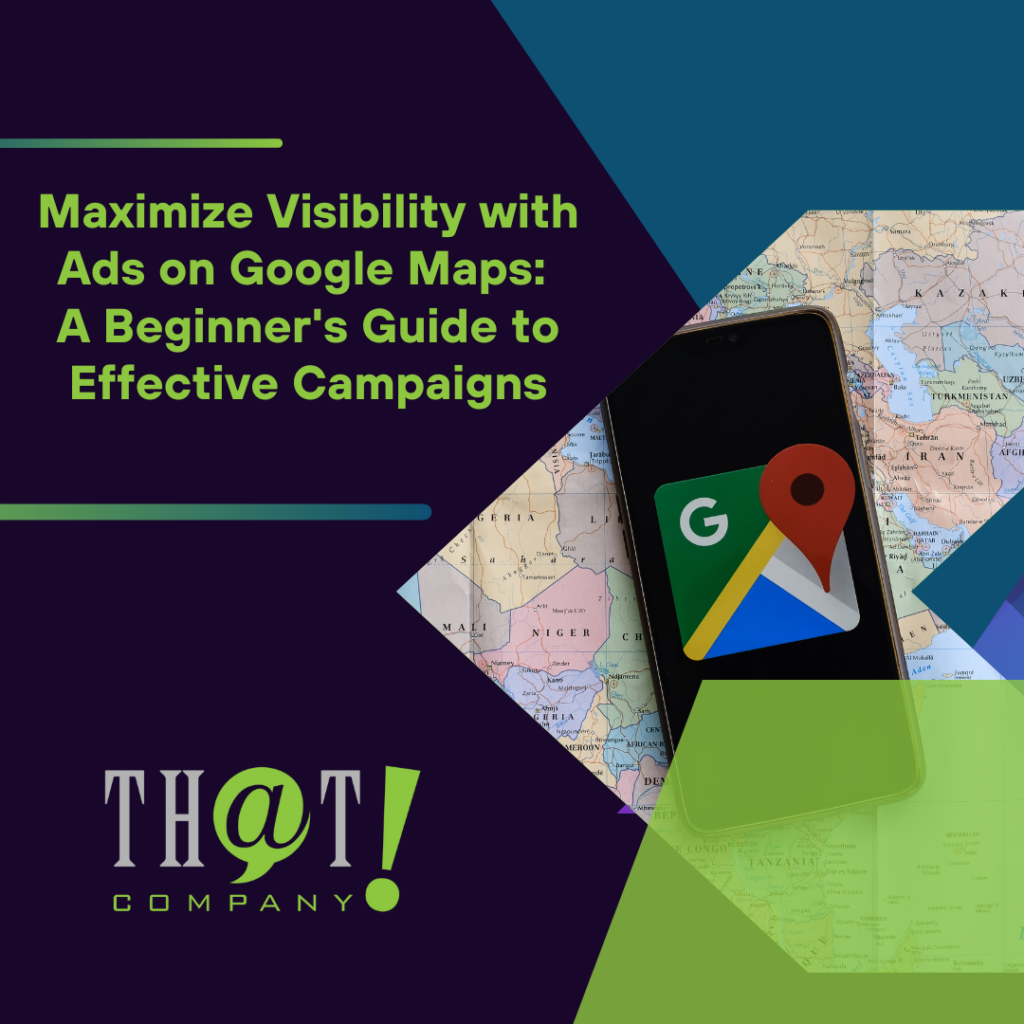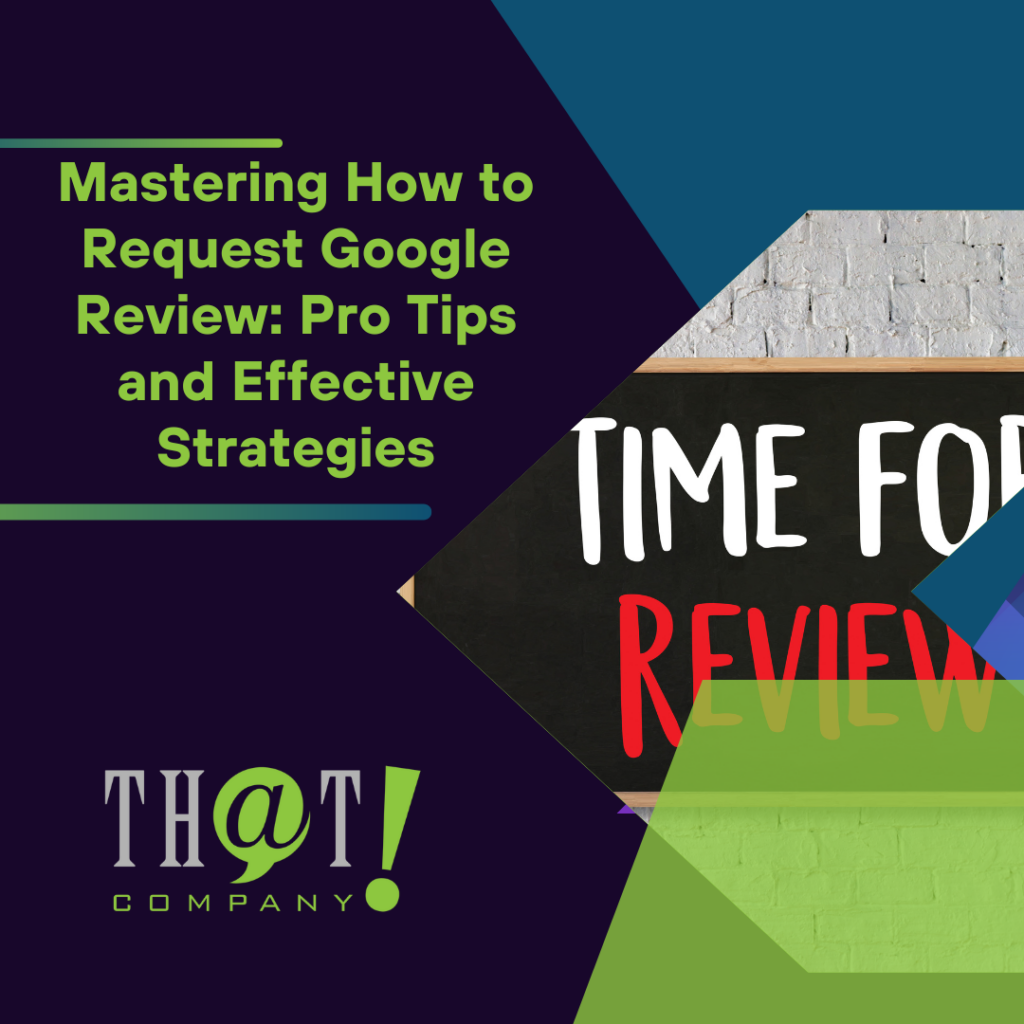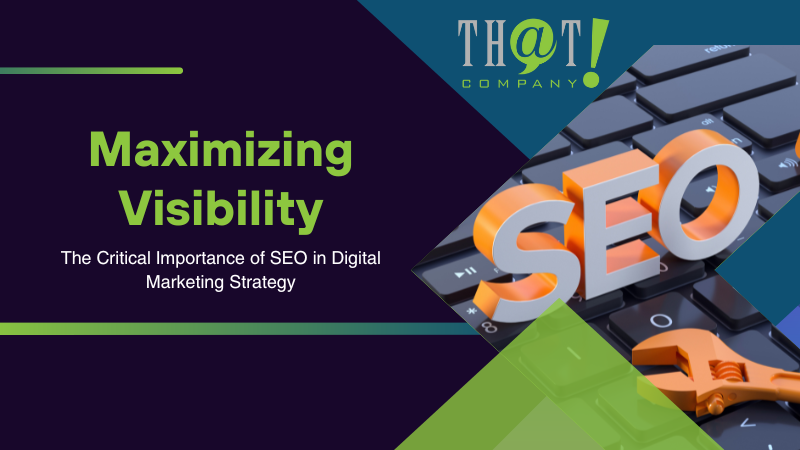
The importance of SEO in digital marketing is critical to success. It amplifies your online visibility and connects you with your target audience. This article cuts through the noise to reveal the pivotal role of the importance of SEO in digital marketing, enhancing brand presence, driving substantial traffic, and building the online trust necessary for lasting success in the digital marketplace.
Key Takeaways
- SEO is vital for enhancing online visibility, elevating brand presence, driving organic traffic, and creating a competitive advantage through strategic keyword targeting and high-quality content.
- On-page optimization, user engagement, and local SEO are key components of an effective SEO strategy, ensuring improved rankings, targeted reach, and a superior user experience that leads to customer retention.
- Incorporating SEO with other digital marketing efforts, regularly adapting to algorithm updates, and investing in long-term strategies fosters brand credibility, maximizes marketing impact, and drives sustainable growth.

Elevating Your Brand: The Role of SEO in Digital Visibility
SEO, or search engine optimization, is the power player in the digital marketing field, instrumental in enhancing a brand’s visibility in search engine results and leading to a more prominent online presence. Understanding the importance of SEO, the primary goal of SEO practices, including technical SEO, is to attract website visitors who are likely to become customers, clients, or part of a returning audience, thereby driving organic traffic. After all, what’s the point of having a fantastic website if no one knows it exists?
With a competitive organic search strategy, including the use of targeted keywords, businesses can outshine competitors in search engine rankings. This optimized visibility through SEO techniques contributes to greater lead generation and enduring competitive advantage for businesses. The beauty of SEO doesn’t end there. It’s a multifaceted tool that goes beyond merely boosting your brand’s visibility. Let’s delve into the practicalities of SEO, starting with boosting organic search presence.
Boosting Organic Search Presence
Organic search results are the unsung heroes of the digital world. They offer unpaid web traffic based on relevance and dedicated SEO efforts, which ultimately lead to conversions and a higher return on investment. Think of it as the digital equivalent of word-of-mouth referrals. It’s not about who can shout the loudest with their advertising budget. Instead, it’s about who can create the most relevant and helpful content for the online community, not only on Google but also on other search engines.
Employing robust SEO techniques offers several benefits, including:
- Improved website rankings over time
- Cost-effective approach by minimizing ongoing advertising expenses
- Consistent targeted traffic from ranking highly for relevant keywords
- Increased leads and long-term customer acquisition
- Boosted visibility through quality backlinks in off-site SEO
It’s important to prioritize the quality of inbound links over sheer quantity for more effective search engine ranking improvements.
Enhancing User Engagement Through SEO
Now, let’s shift our focus to your website. On-site SEO refers to improvements made directly to the content of a website to ensure it is optimized for search engines, leading to increased visibility. It’s not just about filling your content with keywords. It’s about optimizing your title tags and including targeted keywords in URLs as part of on-page SEO techniques. These efforts can significantly enhance your website’s organic reach and visibility in search engine rankings. Some key on-site SEO techniques include:
- Optimizing your title tags
- Including targeted keywords in URLs
- Using header tags to structure your content
- Optimizing your images with alt tags
- Writing high-quality, relevant content
- Using internal linking to improve navigation and user experience
By implementing these techniques, you can improve your website’s visibility and attract more organic traffic.
But SEO isn’t just about pleasing the algorithms. It’s about serving your audience. SEO practices incorporate positive user experiences, which can work to a brand’s advantage in terms of retaining visitor attention and engagement. By creating search engine friendly content, Google’s search quality rater guidelines highlight the value of experience and expertise, underlining the significance of high-quality content for enhancing user engagement. More engaged users mean lower bounce rates, signaling better content relevancy and alignment with user expectations.
So, as you can see, SEO isn’t just about getting people to your site. It’s about keeping them there and providing value.
Leveraging Local SEO for Targeted Reach
Let’s take a moment to consider local SEO. This focuses on optimizing digital properties for a specific vicinity, using local keywords to help people find a business more easily, which is crucial for companies with a local market focus or physical location. Whether you’re a bakery in Brooklyn or a florist in Florida, local SEO can put your business on the map—quite literally.
Improvements in local SEO can be achieved through:
- Claims on directory listings
- Establishing Google My Business pages
- Google Maps
- Fostering social media profiles
- A brand’s Knowledge Graph panel
Moreover, local SEO serves as a powerful lead generator by attracting motivated customers through geographic and intent-based local queries such as ‘near me’ searches. And with the rise of voice-enabled devices, optimizing for voice search by incorporating geographical references becomes an essential element of local SEO. So, whether your customers are typing or talking, robust local SEO ensures you’ll be their top result.

The Synergy Between SEO and Other Digital Marketing Channels
When it comes to digital marketing, SEO doesn’t exist in a vacuum. It integrates seamlessly with various digital marketing channels, ensuring that businesses effectively reach and engage their target audience. Some of the digital marketing channels that work in harmony with SEO include:
- Social media marketing
- Public relations
- Content marketing
- Email marketing
- Pay-per-click advertising
By utilizing these channels alongside SEO, businesses can share optimized content, engage with their audience, and improve their online presence.
Public relations efforts complement SEO by generating online visibility, backlinks, and referral traffic to websites. Together, they help with brand reach and awareness. SEO also complements paid marketing efforts by occupying more real estate on search engine results pages (SERPs) and increasing brand visibility. But the interplay between SEO and other digital marketing channels doesn’t end there.
Let’s delve deeper into the relationship between SEO and content marketing, and the synergies between SEO and paid search.
Integrating SEO with Content Marketing
Content is king, but SEO is the kingmaker. Integrating SEO into content creation prioritizes high-quality content that fulfills both search engine algorithms and user expectations. SEO research guides content marketers to identify relevant and trending topics and keywords, which improves content’s search rankings and visibility to the target audience.
Effective content optimization involves:
- Creating helpful, high-quality content
- Disseminating it through optimized platforms like social media, blogs, and infographics to engage the target audience
- SEO enhances the impact of content marketing by increasing online material visibility, leading to more leads and cost efficiencies over traditional marketing methods.
So, a well-crafted content marketing strategy fueled by robust SEO can be a match made in digital marketing heaven.
SEO and Paid Search: A Dual Approach
When it comes to digital marketing, it’s not an either-or situation. SEO and PPC are two sides of the same coin within a digital marketing strategy, with SEO representing the unpaid side and PPC the paid side, working together to maximize online visibility. For optimal results in a digital marketing strategy, it is recommended to utilize both SEO and PPC when the budget permits, rather than treating them as mutually exclusive options.
Insights derived from SEO, such as keyword performance data, can significantly benefit paid search campaigns by guiding the selection of target keywords for the ads. Conversely, data and trends from PPC advertising can inform and enhance organic SEO strategies by providing valuable insights into competitive keywords and search topics. Therefore, an integrated approach, leveraging both SEO and PPC, can yield a more effective and comprehensive digital marketing strategy.
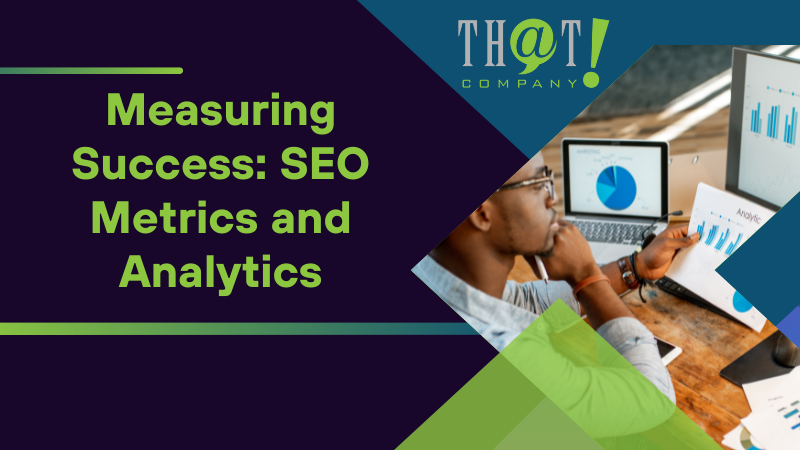
Measuring Success: SEO Metrics and Analytics
In digital marketing, as in life, what gets measured, gets managed. To show the success of SEO, it is critical to measure its impact on digital performance. SEO results can be quantifiably measured using tools like Google Analytics to monitor organic traffic, conversions, and keyword rankings. Through these metrics, you can steer your SEO strategy in the right direction, ensuring maximum impact and return on investment.
Performance reporting in SEO is crucial for making data-driven decisions and improving SEO strategies. Comparing organic traffic to that of main competitors can offer insights into a website’s performance and identify areas for strategic improvement. But how exactly do we track organic traffic growth, and what can SEO data tell us about user behavior? Let’s delve deeper.
Tracking Organic Traffic Growth
Google Analytics is a marketer’s best friend when it comes to monitoring organic traffic. It allows users to monitor organic traffic through the ‘Traffic acquisition’ report, which provides data on sessions from organic search. Ranking successfully for a target keyword requires providing the best possible content that is structured in accordance with Google’s ranking factors.
Implementing a proactive, long-term SEO strategy can prevent the ‘flatline of nope’, a condition where website traffic stalls due to discontinuation of optimization. Remember, SEO isn’t a one-time fix but a continuous effort that yields results over time. By tracking organic traffic growth, you can ensure your SEO efforts are paying off and paving the way for sustained success.
Understanding User Behavior with SEO Data
Understanding your audience is key to successful marketing, and here, SEO data comes to the rescue. Google Analytics serves as a critical tool in understanding user behavior by monitoring various user interactions on a website. Tracking key events or conversions with Google Analytics, such as newsletter signups or purchases, enables marketers to tailor their strategies based on actions completed by users.
Assessing the engagement time, or the average duration a user spends on a webpage, provides insights into how well the content satisfies the user’s search intent. SEO is not just about attracting visitors—it’s about understanding them, engaging them, and turning them into customers. By analyzing user behavior with SEO data, you can ensure your SEO strategy is tuned to your audience’s needs and behaviors.
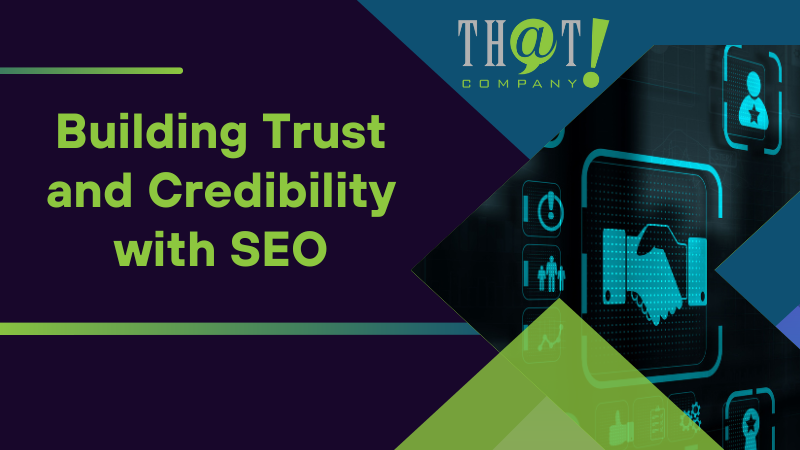
Building Trust and Credibility with SEO
In the digital world, trust is currency. Higher optimization leads to appearing higher in search engine results, which can enhance a brand’s trustworthiness. Frequent appearance in search results creates the perception of a trusted and credible source of information. Ranking highly in organic search results signifies authority and relevance, leading to increased trust from internet users.
SEO contributes to a company’s authoritative voice in the industry, which builds brand trust. By adhering to Google’s E-A-T guidelines that measure content value based on expertise, authoritativeness, and trustworthiness, your brand can establish a strong online reputation. But how do we build this trust and credibility? The answer lies in high-quality backlinks and high SERP positions.
The Influence of High-Quality Backlinks
Backlinks are the building blocks of trust and credibility in the world of SEO. High-quality backlinks are endorsed by other websites and play a significant role in improving search rankings. Establishing a network of external links to trustworthy and reputable sources enhances a site’s search engine ranking and demonstrates content relevance and authority.
Dofollow backlinks from respected domains have a greater impact on a website’s SEO and can positively influence search engine rankings. The significance of a backlink to a website’s SEO strategy is considerably influenced by its relevance, the authority of the linking domain, and its ability to generate referral traffic. In the realm of SEO, it’s all about quality, not quantity.
Earning Customer Confidence Through High SERP Positions
High SERP positions aren’t just about visibility—they’re about credibility. Relaying messaging through SEO enhances brand reliability and aids in making worthy connections, influencing trust during the buying cycle.
Being at the top of search results doesn’t just mean you’re seen—it means you’re trusted. And this trust is a crucial factor that can influence a customer’s decision to choose your brand over others.

Crafting a Winning SEO Strategy with That! Company
When it comes to SEO, it takes a village. That! Company offers white label SEO services which allow agencies to rebrand and resell SEO solutions, creating an environment where they don’t have to invest in their own resources for SEO expertise or infrastructure. Whether you’re an SEO firm or an independent marketer, That! Company can be your trusted partner in delivering exceptional SEO services under your own brand.
The array of services provided by That! Company under their white label digital marketing services offerings ensures quality consistency through a centralized service model. With over a decade of specialization in white label SEO services that started in 2010, That! Company has served more than 500 agencies, reinforcing their position as a preferred SEO provider to other SEO agencies.
Let’s delve deeper into how That! Company’s white label SEO services can be tailored to diverse needs and how they offer scalability and support. They also a PPC and white label SMM company.
Tailored SEO Solutions for Diverse Needs
That! Company partners with a diverse range of organizations, offering flexible SEO services to fit different business models. Customizable white label SEO solutions allow agencies to deliver strategies that are specifically tailored to the needs of their clients.
Whether your client is a small business looking for white label local SEO services or a multinational corporation seeking a comprehensive SEO strategy, That! Company has got you covered.
Scalability and Support: White Label SEO Services
Scaling your business doesn’t have to mean scaling your workload. That! Company offers scalable white label SEO services, including:
- Keyword research and optimization
- On-page optimization
- Link building
- Content creation
- Local SEO
These services help partner agencies expand their offerings without incurring additional overhead, while also providing opportunities to upsell to existing clients.
The centralized model adopted by That! Company ensures quality control of all white label SEO services, with a US-based team delivering consistent and clear communication across various campaign facets. They even extend sales support to partner agencies, assisting with sales calls preparation and providing the necessary support to close new client deals successfully.
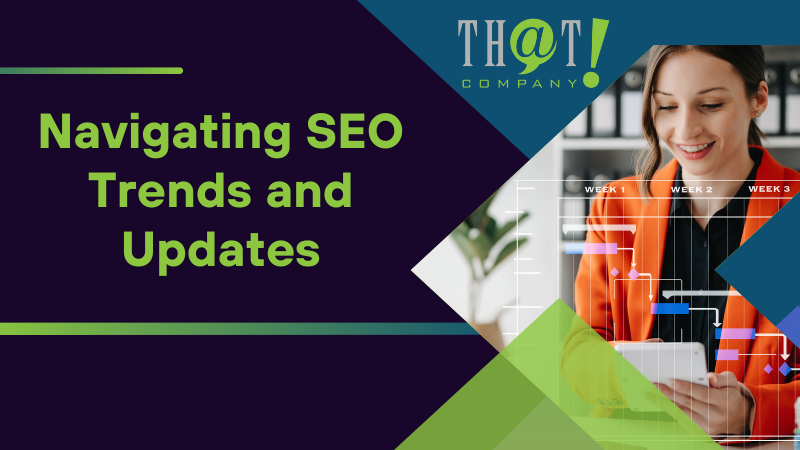
Navigating SEO Trends and Updates
In the ever-changing landscape of digital marketing, staying updated with SEO trends and adapting to search engine algorithm changes is essential. By doing so, businesses can maintain online competitiveness and uncover new avenues to connect with their target audience. At That! Company, we aid agencies in keeping pace with the constant evolution of search engine algorithms and the digital marketing landscape, ensuring long-term SEO success.
But how do we adapt to these algorithm changes, and how do we embrace emerging technologies in SEO?
Adapting to Algorithm Changes
In the world of SEO, change is the only constant. Google makes thousands of algorithm changes a year, which impacts how SEO strategies are executed. A significant update to Google’s algorithm was the BERT model, which improves the understanding of search intent using natural language processing and machine learning. With the help of BERT, Google Search has become more efficient in understanding and delivering relevant results.
Frequent algorithm changes require continuous monitoring and updates to SEO practices to maintain a website’s search visibility. Adapting to these algorithm updates, such as BERT, is crucial for implementing up-to-date SEO best practices. In other words, staying on top of SEO means staying on top of these algorithm changes.
Embracing Emerging Technologies in SEO
As we navigate the digital landscape, we must also embrace emerging technologies. Artificial Intelligence (AI) has significantly influenced the approach to SEO by affecting keyword analysis and potentially shaping overall SEO strategies. Generative AI has emerged as a notable term in the SEO space, indicating its growing relevance.
While AI can enhance content refinement for expertise and authoritativeness, it cannot replace the authentic human experience necessary for true trustworthiness. As such, it is essential for SEO professionals to develop skills like understanding machine learning and analytical thinking to keep pace with AI-driven changes in the field. It’s a brave new world, and SEO is at the forefront of this digital revolution.

The Long-Term Value of SEO in Marketing
SEO is not a sprint—it’s a marathon. Pages that achieve top positions in search engine results are often those that have been optimized for SEO for over two and a half years, emphasizing the sustained success SEO can deliver over time. Continuous SEO activities are crucial as they help maintain and improve a website’s standing against competitors who are also constantly optimizing their online presence.
The revenue generated from SEO can be reinvested into further content creation, which in turn attracts more traffic and customers, creating a growth loop that underlines the scalability of SEO. The extent of time, effort, and budget invested in SEO is directly proportional to the duration and strength of a website’s competitive position in the market. SEO not only aids consumers in finding solutions but also significantly benefits brands in their marketing endeavors, cementing SEO as a long-term asset for growth and visibility.
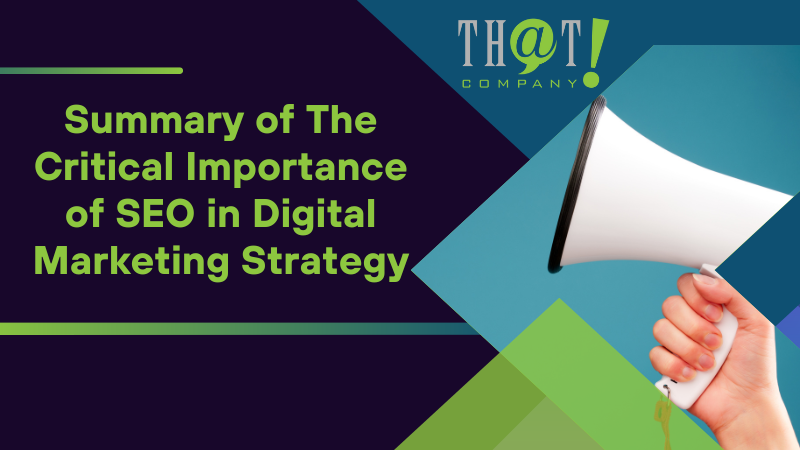
Summary
In the end, SEO isn’t just a tool—it’s a strategy. From enhancing brand visibility and driving organic traffic to building trust and credibility, SEO plays a critical role in digital marketing. Whether you’re integrating SEO with content marketing or adapting to algorithm changes, SEO is the secret sauce that makes your digital marketing strategy sizzle. With That! Company as your partner, you can navigate the ever-evolving landscape of SEO and craft a winning digital marketing strategy. Remember, SEO is not just about being seen—it’s about being found where it matters. And that’s what we do best at That! Company, ‘The SEO Agency That Other SEO Agencies Use.’

Frequently Asked Questions
What is the importance of SEO in digital marketing?
SEO is crucial in boosting your brand’s visibility in search results, driving organic traffic, and maintaining a competitive edge in digital marketing. It’s instrumental in enhancing your online presence and lead generation.
How does SEO integrate with other digital marketing channels?
Integrating SEO with other digital marketing channels, such as social media, PR, content marketing, and paid search, enhances online visibility and engages the target audience effectively. This collaboration creates a powerful impact on your digital marketing efforts.
What is the role of Google Analytics in SEO?
Google Analytics plays a crucial role in SEO by providing essential data on organic traffic, conversions, and keyword rankings, enabling informed decision-making and improved SEO strategies. It’s a must-have tool for optimizing website performance.
How does high-quality backlinks contribute to SEO?
High-quality backlinks from respected domains not only enhance your site’s search engine ranking but also demonstrate your content’s relevance and authority, ultimately building trust and credibility for your brand.
What are the benefits of partnering with That! Company for white label SEO services?
Partnering with That! Company for white label SEO services allows agencies to rebrand and resell SEO solutions without investing in their own resources for SEO expertise or infrastructure, providing scalable services and centralized support to help expand offerings. It’s a great way to enhance your agency’s services!



















